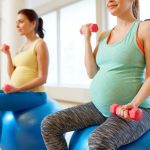ANTE & POSTNATAL PHYSIOTHERAPY and PILATES

Pregnancy is an exciting time but can often bring with it musculoskeletal pain. Hormonal changes during pregnancy soften the ligaments and the joints become less stable; the resultant increase in movement can lead to aches and pains in the back and pelvis. As a result of the increasing weight of your baby and a change in your centre of gravity, your posture may also change, which may place further strain on your back.
Ante and post-natal Physiotherapy and Pilates addresses problems such as pelvic girdle pain, rectus abdominus diastasis and pelvic floor dysfunction. It can also help with strength and conditioning during and after pregnancy.
Common Pregnancy related musculoskeletal complaints:
Pelvic girdle pain and low back pain
Pregnancy related low back pain and pelvic girdle pain are common conditions during pregnancy. Typically starting during the second or third trimester, pregnancy related low back pain can be related to an increase in the hormone called Relaxin. Relaxin causes softening of various ligaments in preparation for the baby to exit the birth canal safely, but in some cases, it can lead to the onset of pregnancy related low back pain and pelvic girdle pain due to over-loading of the soft tissue structures of this area. Strengthening exercises targeting the glutes and core can help to alleviate the symptoms of pelvic girdle pain and low back pain during pregnancy.
Rectus Abdominis Diastasis
Post-natally some mums will be aware of a gap between their abdominals, this is called a Rectus Abdominus Diastasis and is the result of the main tendon of the abdominals being stretched as the baby grows. This can recover somewhat during the first few months post-natally and can be helped by performing the right type of exercise. This is addressed in our post-natal physiotherapy sessions and post-natal Pilates classes.
Pelvic Floor Dysfunction
The pelvic floor is the group of muscles spanning the base of your boney pelvis, held in place by ligaments that support the pelvic organs. They are important for the control of your bladder and bowel, for sexual function, and to support your pelvic organs to help prevent prolapse. They are also crucial in the stability of the low back and pelvic joints. The increasing weight of your baby during pregnancy, followed by the delivery, may weaken your pelvic floor muscles. If this support is reduced you may leak urine when you exert yourself, especially after your baby is born. To try to prevent this you should exercise your pelvic floor muscles every day. Seeing a physiotherapist can help learn how to do these exercises correctly.
What Exercise can I do during pregnancy?
Mild to moderate exercise is beneficial during pregnancy for both mum and baby. Brisk walking, swimming or ante-natal Pilates are all ways to maintain or increase fitness levels during pregnancy. If you are not used to exercising, it is advisable to start with some low impact exercise such as walking, swimming or Pilates. Begin with 15 minutes continuous activity, 3 times a week, gradually increasing to 30 minutes at least 4 times a week. As your pregnancy progresses, continue with familiar activities, and remember that it is natural to slow down.
Always check with your doctor or therapist before starting a new form of exercise whilst pregnant.
Exercise tips during pregnancy:
- Drink plenty of water to avoid dehydration
- Work within your limits to avoid getting too hot or breathless
- Listen to your body – stop if you are feeling uncomfortable, tired, or unwell
- If you are a regular runner, it is safe to run during pregnancy at a low intensity, but it may be uncomfortable as your pregnancy progresses
- Avoid competitive or contact sports and sports that are unfamiliar to you
- Hot, humid, and high-altitude conditions or low depth conditions are unsuitable to exercise in and should be avoided
- Stop any exercise which causes pain, especially in the back or the pelvis
- It may be beneficial to attend a pregnancy exercise class such as antenatal Pilates, working on pelvic floor, posture, and core stability exercises
Pilates and Pregnancy
Pilates during and after pregnancy can greatly help to limit or manage symptoms felt during the latter stages of pregnancy and during the post-natal phase. Ante and post-natal Pilates uses traditional Pilates exercises adapted for the different ante and post-natal stages. Ante and post-natal Pilates can include matwork exercises for core stability and general mobility and flexibility plus the use of small equipment and large equipment such as the Reformer for more advanced work. Each specific ante and post-natal Pilates exercise is adapted and individualised where required to suit the needs of the person.
At MSO Physio we have physiotherapists who specialise in ante and post-natal Pilates and the management of pain and problems associated with pregnancy. Clients will always be seen on an individual basis first to understand their particular needs and then both 1-2-1 and small group classes are possible under the watchful eye of a specialist physiotherapist in our dedicated studio.

